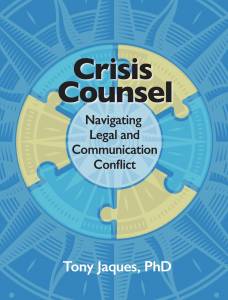Speaking out on Gaza: Stepping into Quicksand
by Tony Jaques, Director of Issue Outcomes Pty Ltd, for people who work in issue and crisis management
As the war in Gaza drags on, more and more organizations find themselves facing the question: Should we make a statement? And what is the price if we say nothing?
It’s like taking the first step into quicksand, aware there may be no way across, and the more you struggle the deeper you are certain to be sucked in.
Many individuals have faced backlash for supporting one side or the other in the conflict, like outspoken actress Susan Sarandon, dumped by her talent agency; European footballers Anwar El Ghazi and Youcef Atal, suspended for social media posts deemed unacceptable; and Australia Cricketer Usman Khawaja sanctioned, for wearing a black armband on the field.
Even Playboy felt compelled to sack former porn actress Mia Khalifa for praising the 7 October Hamas attackers.
But for corporations and other organizations, speaking out is a much harder decision, with a great deal more at stake.
Support for companies and CEOs to take a stand on significant social or political issues has been strong in recent years, as demonstrated by the thousands of organizations around the world which took a stance against the Russian invasion of Ukraine.
Yet, the war in Gaza has exposed a very different dynamic, with many organizations torn between proponents for either side, each demanding a statement, then arguing it wasn’t right or wasn’t enough. Or, employees attacking management for not saying anything.
As New York crisis consultant Davia Temin told Bloomberg; “If you say something, it’s about what you say. But equally, you are at risk if you say nothing, because silence is a statement, so silence is controversial as well.” It may be a cliché, but this truly is a classic “Damned if you do and damned if you don’t.”
The challenge for big corporations is well illustrated by what happened to McDonald’s. When independent McDonald’s stores in Israel provided free food to IDF personnel, calls to boycott the fast-food giant spread across social media. Meantime, other McDonald’s franchisees in the Middle East and elsewhere disavowed the Israeli operation and pledged aid for Gaza.
McDonalds’ CEO Chris Kempczinski eventually issued a statement saying the company “firmly condemned violence and hate speech” and is “deeply disturbed by the acts of antisemitism and Islamophobia.” But his message didn’t specifically mention Israel or Hamas, or address tension between franchisees. Predictably, it didn’t satisfy anyone.
Starbucks was another big global chain exposed by the war, when its worker union – not the company – posted pro-Palestine messages. The result was some Jewish leaders calling for a boycott of Starbucks as a whole and vandalism at a number of stores. The company said protesters had been “influenced by misrepresentation on social media,” but of course, the damage had already been done, with sales and share prices starting to fall.
It’s not just corporations that get caught in the middle. When University of Sydney banned a pro-Palestine meeting, organizers argued they were being censored, while supporters of Israel claimed the university was not doing enough to protect them from antisemitism.
Then there was the notorious Senate hearing in the US where the Presidents of three prestigious universities tried to argue that antisemitic demonstrations and threats on campus might not be considered harassment, “depending on the circumstances.” Unsurprisingly, two lost their jobs.
There is no winning strategy here, but there are some key questions to consider before taking a stance:
- Which stakeholders will respond most strongly, and which ones matter most?
- Does the proposed stance align with your organization’s strategy and values?
- How will this play out for your customers and employees?
- Do the Board/major shareholders/sponsors support your decision?
- Will speaking out serve any real purpose, or is it purely performative?
- Are you willing to accept the consequences of speaking out (or keeping silent)?
And finally, remember that once you first step into the quicksand there is no turning back.
A Parting Thought
Never test the depth of a river with both feet.
Warren Buffett
Learn more about Reputation Risk, CEO apologies, and Crisis communication in Tony Jaques’ new book, Crisis Counsel: Navigating Legal and Communication Conflict.
Click HERE to find Tony’s book at Amazon.com
“Crisis Counsel confirms Tony Jacques’ position as one of the industry’s foremost experts on issues and crisis management. In addressing the complex interactions between legal and communication crisis responses, Dr. Jacques provides riveting case studies and practical advice. It highlights the financial and reputation risks of not effectively integrating communications and legal counsel. It should be on every communications practitioner’s reading list, and companies should insist their in-house and external legal counsellors read it.” – Noel Turnbull, Former Chair of Turnbull Porter Novelli, Adjunct Professor, RMIT University.

